In the fast-paced world of business, managing human resources effectively is vital for success. Knowing how to choose an HR management system is crucial, as HR management systems (HRMS) have become indispensable tools for companies of all sizes. These systems streamline various HR functions like recruitment, payroll, performance management, and employee engagement, making the HR department more efficient and effective.
Why are HR management systems so important?
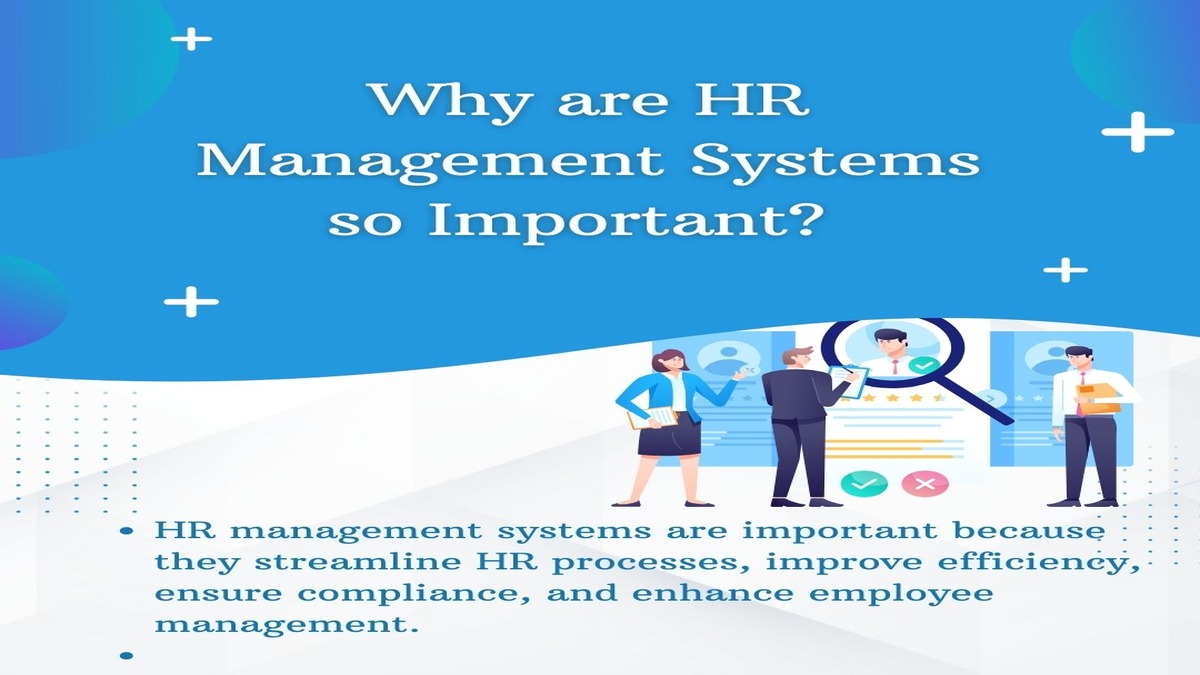
- Time Saving: First and foremost, they save time. Manual HR processes are slow and prone to errors. Automation through an HRMS reduces administrative workload, allowing HR professionals to focus on strategic tasks. This not only boosts productivity but also leads to better decision-making.
- Enhances Compliances: Secondly, HRMS enhances compliance. Labor laws and regulations can be complex and vary by region. An HRMS helps ensure that all HR activities are compliant, reducing the risk of legal issues and penalties.
- Data Management: Moreover, data management is another critical area. HRMS centralizes employee data, making it easier to track, analyze, and report. This data-driven approach allows companies to identify trends, improve employee retention, and plan for future staffing needs.
- Employee Experiences: Employee experience also improves with HRMS. Self-service features empower employees to handle tasks like leave applications, benefits enrollment, and updating personal information without HR intervention. This leads to higher employee satisfaction and engagement.
In summary, an HR management system is not just a tool but a strategic asset that enhances efficiency, compliance, data accuracy, and employee satisfaction. With these benefits, it’s clear why more businesses are investing in HRMS solutions to stay competitive and thrive.
Key Features to Look for in HR Software
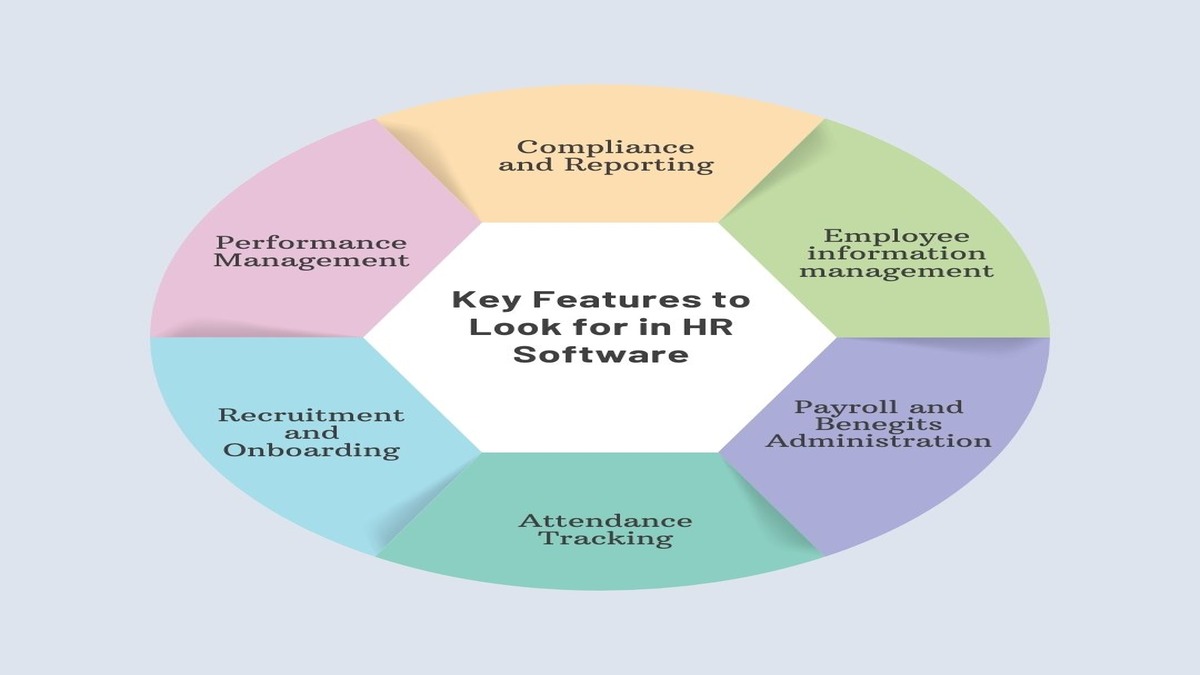
Choosing the right HR management system is crucial for streamlining your HR processes and improving overall productivity. When selecting HR software, it’s essential to focus on the key features that will best support your business needs and enhance employee experience.
- Employee Information Management: The core of any HR software is its ability to store and manage basic employee information efficiently. Look for a centralized database that allows easy access and updates to personal, employment, and performance data.
- Payroll and Benefits Administration: Effective HR systems should simplify payroll processing and benefits administration. Ensure the software can handle tax calculations, direct deposits, and compliance with local labor laws. Integration with benefits providers can also save time and reduce errors.
- Time and Attendance Tracking: Accurate tracking of employee hours, leave requests, and attendance is essential. A reliable system should offer automated time clocks, leave management, and real-time reporting to keep everything organized.
- Recruitment and Onboarding: A robust HR management system should streamline the recruitment process from job postings to onboarding new hires. Look for features like applicant tracking, resume parsing, and automated communication with candidates.
- Performance Management: Performance reviews and goal tracking are key to employee development. An ideal system will support continuous feedback, annual reviews, and performance metrics to help managers and employees stay aligned.
- Employee Self-Service: Empower employees with self-service options for updating personal information, accessing payslips, and managing their benefits. This reduces the HR team’s workload and improves employee satisfaction.
- Compliance and Reporting: To stay compliant with labor laws and regulations, choose HR software that offers comprehensive reporting and analytics. The ability to generate customizable reports ensures you meet compliance requirements and make informed decisions.
By focusing on these essential features, you can select an HR management system that not only meets your current needs but also scales with your business as it grows. Make sure to choose a user-friendly, customizable system that can integrate with your existing processes and technologies.
Evaluating an HR management system
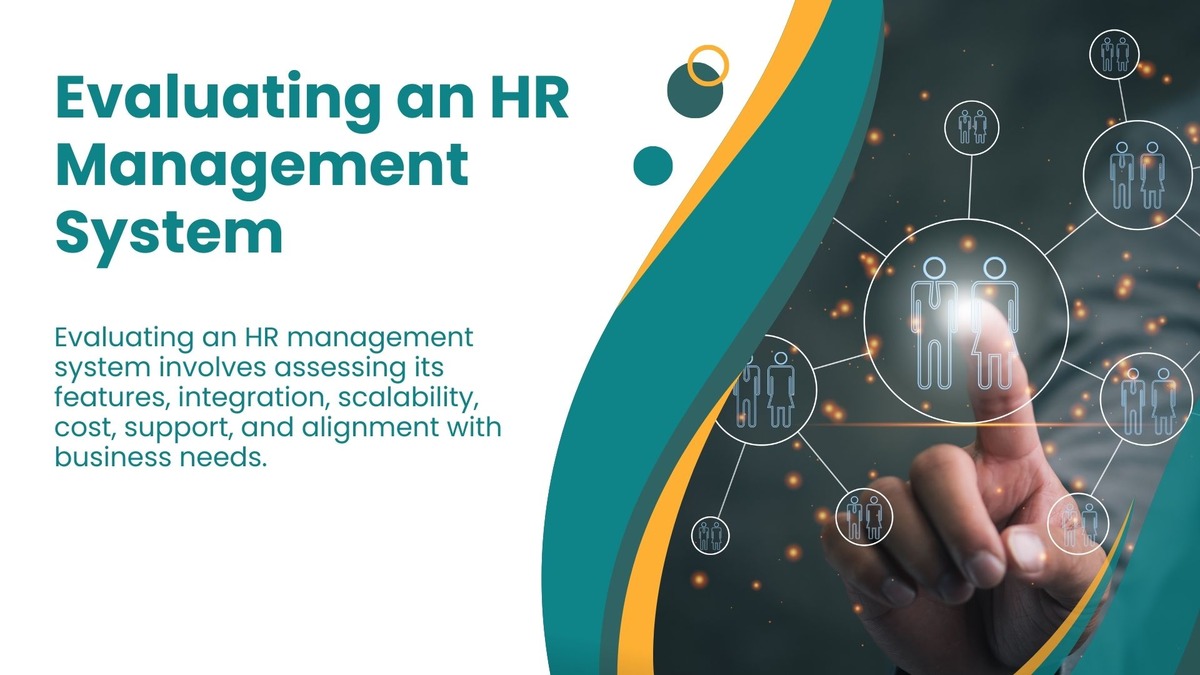
Evaluating an HR management system is crucial for ensuring that it meets your business needs and supports your HR functions effectively. Here are some best practices to guide you through the evaluation process:
- Assess Your Needs: Identify the specific HR functions you need support for, such as payroll, recruitment, performance management, and employee engagement. Understanding your requirements will help narrow down the options.
- Usability and User Experience: Ensure the software has an intuitive interface that is easy for your HR team and employees to navigate. A user-friendly system reduces the learning curve and increases adoption rates.
- Scalability: Choose a system that can grow with your business. Whether you’re a small startup or a large enterprise, the software should be able to handle an increasing number of employees and more complex HR processes as your company expands.
- Integration Capabilities: The HR system should integrate seamlessly with other software you use, such as accounting systems, project management tools, and communication platforms. Smooth integration ensures streamlined operations and data consistency across departments.
- Customization Options: Look for software that allows you to customize features and workflows to match your specific HR processes. This ensures the system works for you, rather than you having to adapt to the system.
- Vendor Support and Training: Opt for a vendor that provides robust support and training. Effective customer service and comprehensive training resources are essential for troubleshooting issues and maximizing the software’s potential.
- Cost and ROI: Consider the total cost of ownership, including setup fees, subscription costs, and any additional charges for extra features or support. Weigh these costs against the potential return on investment to ensure you’re making a financially sound decision.
By following these best practices, you can evaluate HR management systems more effectively and choose the one that aligns perfectly with your business goals and needs.
Comparing Top HR Management Systems
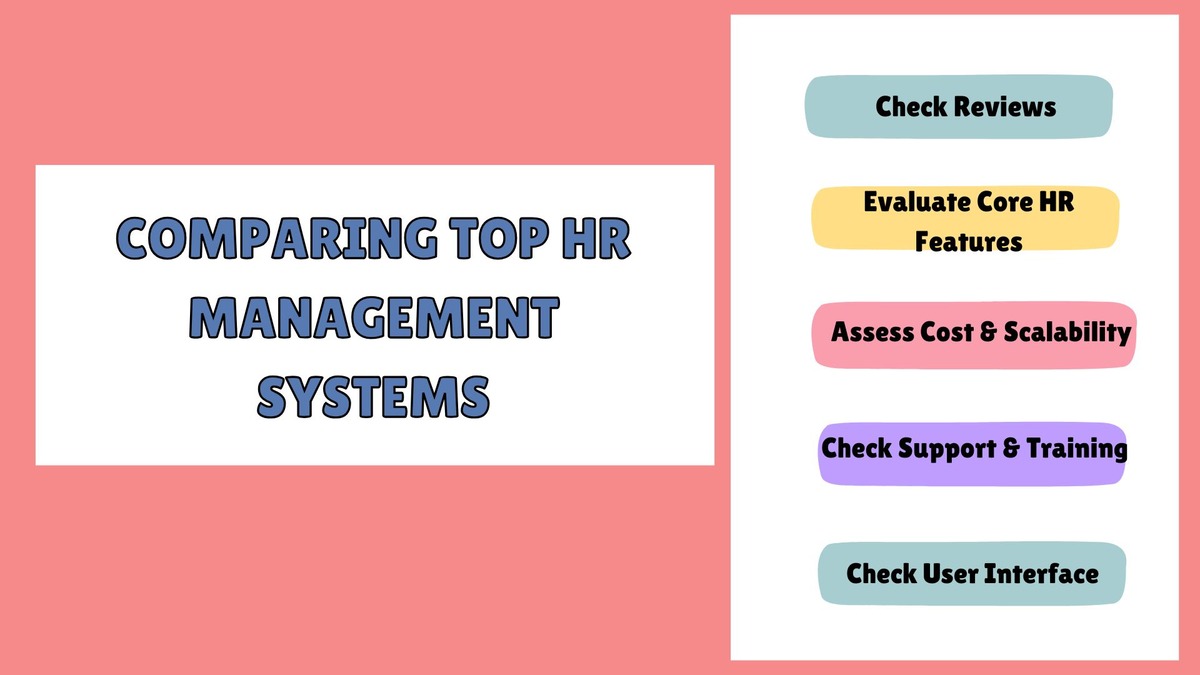
When it comes to selecting the right HR management system, it’s crucial to compare the top contenders in the market to ensure you find the best fit for your business.
- Check Reviews: Start by looking at user reviews and expert ratings on reputable sites like G2 and Capterra. These platforms offer insights into customer satisfaction and the pros and cons of each system.
- Evaluate Core HR Features & Tools: Next, consider the core features that each HR management system offers. Key functionalities like payroll management, employee self-service portals, performance tracking, and applicant tracking systems are essential. Look at how each software integrates with other tools you currently use, like accounting software or project management platforms.
- Assess Cost & Scalability: Cost is another critical factor to consider. Some HR systems have a hefty upfront fee, while others operate on a subscription model. Don’t just look at the price tag; assess the value offered for the cost. Does it offer scalability as your business grows? Can you add or remove features based on your changing needs?
- Check Support & Training OptionsAdditionally, customer support and training are paramount. You want a provider that offers robust customer service to help you through any issues as quickly as possible. Also, inquire if they offer training materials or sessions to help your team adapt to the new system efficiently.
- Check User Interface and Experience: Lastly, consider the user interface and experience. A system that is difficult to navigate will not be used effectively, defeating its purpose. Take advantage of free trials or demos offered by most HR software vendors. This hands-on experience will give you a feel for the usability and functionality of the system.
By thoroughly comparing top HR management systems based on these criteria, you can make an informed decision that aligns with your business needs, improves efficiency, and streamlines HR processes.
Tips for Successful Implementation of HR Software
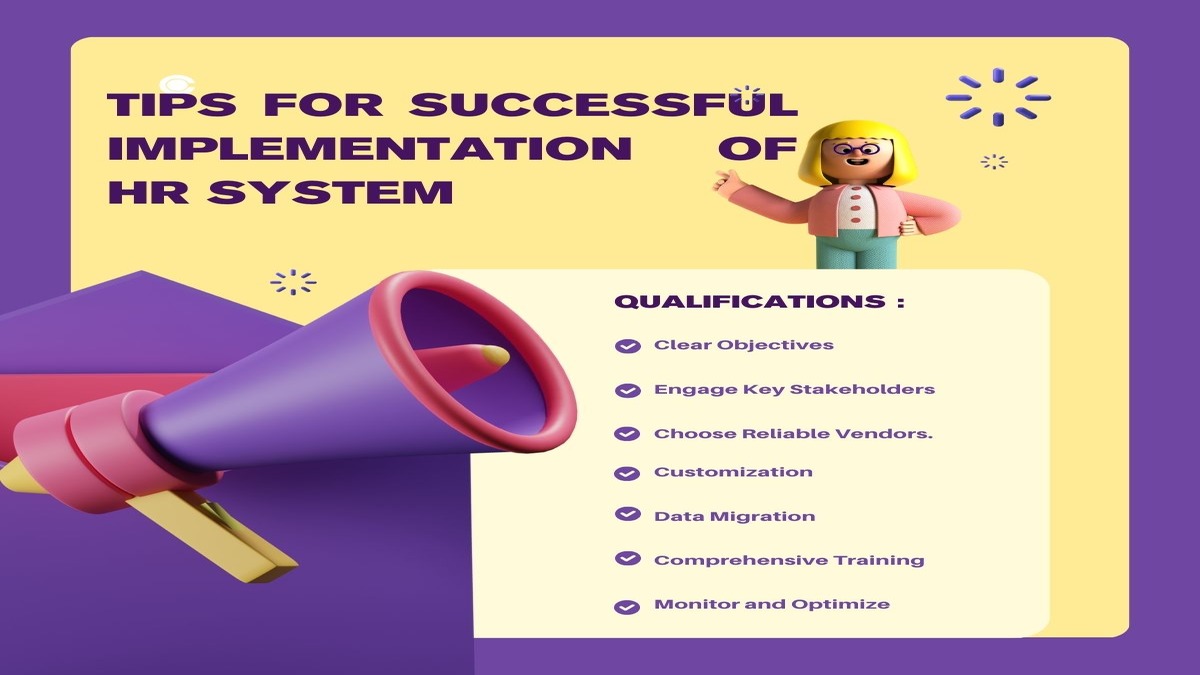
Implementing an HR management system requires careful planning and execution to ensure a smooth transition and maximize the system’s benefits. Here are some proven tips to help you successfully implement your new HR software:
- Define Clear Objectives: Start by identifying the specific needs and goals your HR management system must address. Whether it’s streamlining payroll, improving recruitment processes, or enhancing employee engagement, clear objectives will guide your implementation strategy.
- Engage Key Stakeholders: Involve HR professionals, IT staff, and end-users early in the process. Their input and buy-in are crucial for a successful rollout. Host meetings and workshops to gather their feedback and address any concerns.
- Choose a Reliable Vendor: Partner with a reputable HR software vendor with a proven track record. Ensure they provide comprehensive support and training resources to help your team get up to speed with the new system.
- Customize to Fit Your Needs: Most HR management systems offer customization options. Tailor the software to meet your organization’s unique requirements while avoiding unnecessary complexity. Custom fields, workflows, and user roles may need specific adjustments.
- Plan for Data Migration: One of the most critical steps is transferring existing data into the new system. Create a detailed data migration plan to ensure accuracy and minimize disruptions. Test the data migration process to identify and resolve any issues beforehand.
- Provide Thorough Training: Educate your staff on how to use the new HR software effectively. Offer comprehensive training sessions and create user manuals or video tutorials for ongoing reference. The more proficient your team is, the smoother the transition will be.
- Monitor and Optimize: After the initial implementation, continuously monitor the system’s performance. Collect feedback from users and make necessary adjustments. Regularly update the software to take advantage of new features and improvements.
By following these tips, you can ensure a successful implementation of your HR management system, ultimately leading to increased efficiency and better HR outcomes for your organization.
Conclusion: Making the Right Choice for Your Business Needs

Choosing the right HR management system is a crucial step in optimizing your company’s workforce efficiency and productivity. Start by assessing your business’s specific needs, including the size of your company, budget constraints, and the unique HR challenges you face. This assessment will guide you in identifying the features you truly need, such as payroll management, recruitment tools, or performance tracking.
-
Compare HR Systems:
Once you have a clear understanding of your requirements, research and compare various HR management systems. Look for software that offers a user-friendly interface, robust support, and scalability to grow with your business. Pay close attention to customer reviews and testimonials to gauge the software’s reliability and the quality of support provided.
-
Ensure Integration Capabilities:
Don’t overlook the importance of integration capabilities. Your HR management system should seamlessly integrate with other tools you use, such as accounting software or communication platforms, to ensure a smooth workflow across your organization.
-
Implementation and Support:
Implementation is another critical factor. Choose a vendor that offers comprehensive training and ongoing support to help your team transition smoothly and maximize the software’s potential. Ensure that the system is customizable to adapt to your evolving needs without requiring extensive reconfiguration.
-
Choose a Future-Proof Solution:
Lastly, consider future-proofing your investment. Opt for a solution that not only meets your current needs but also has the flexibility to update and improve as your business grows. Making an informed choice will lead to better HR management, more engaged employees, and, ultimately, a more successful business.
Read More: Top 10 Popular SaaS Marketing Blogs in 2024

